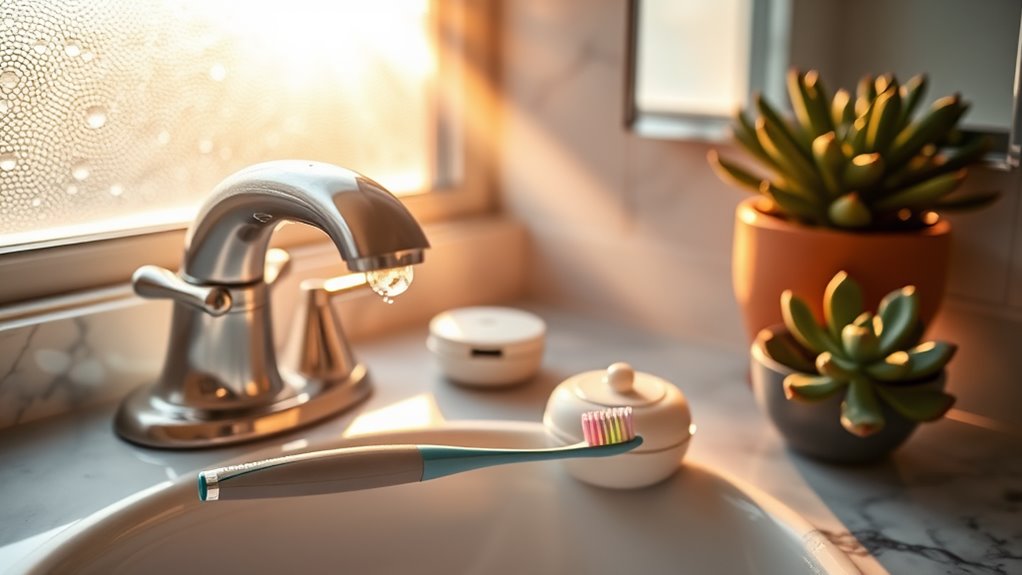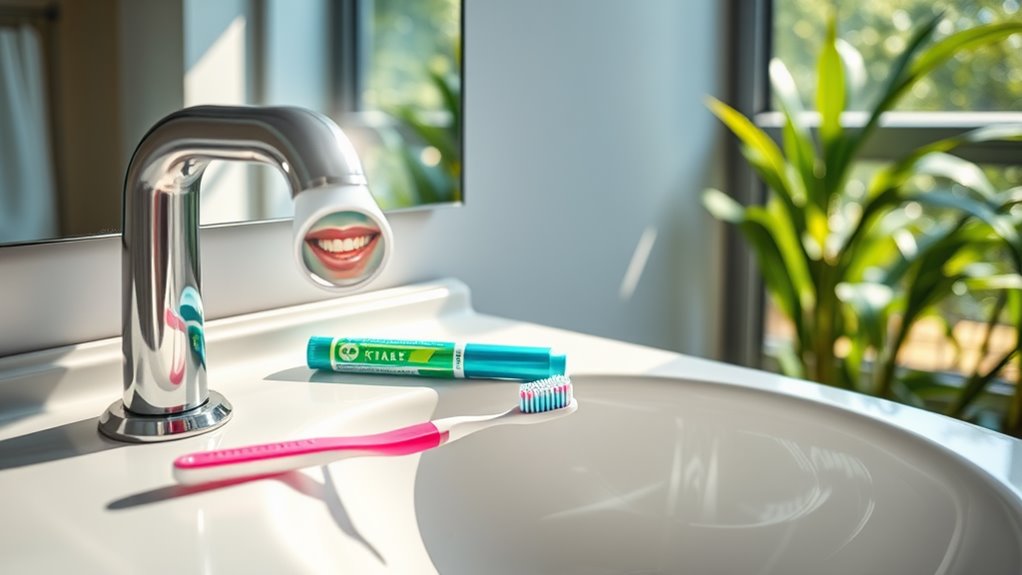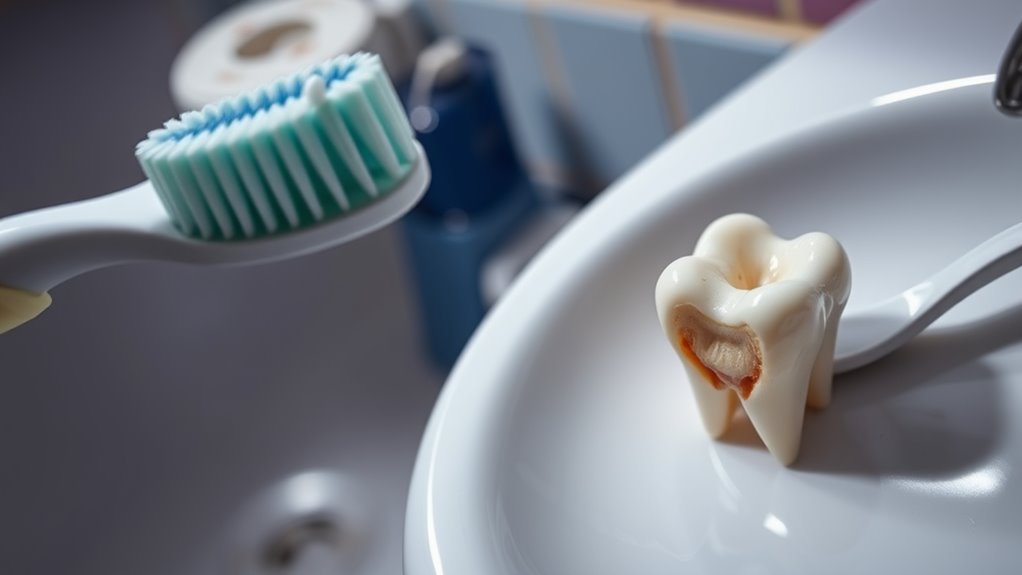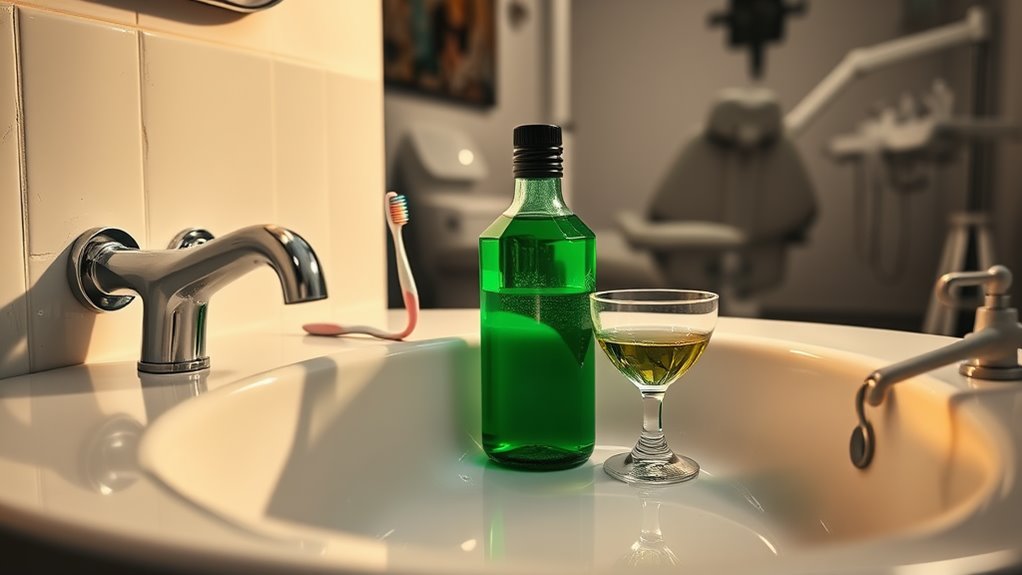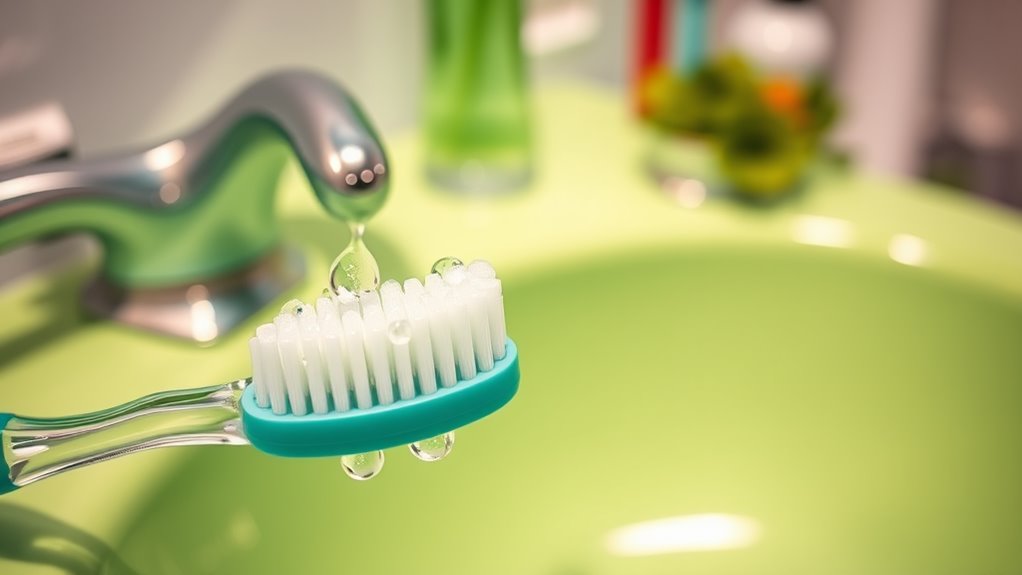Best Times of Day to Brush and Floss (It Matters More Than You Think)
Key Takeaways
- Brush in the morning to remove overnight plaque buildup and prevent cavities for fresh breath throughout the day.
- A midday brush after lunch helps eliminate food particles and combats bad breath, boosting afternoon confidence.
- Flossing after meals prevents plaque accumulation and is vital for maintaining gum health.
- Brush before bed to combat nighttime bacteria and reduce the risk of cavities and gum disease.
- Wait 30 minutes after meals before brushing to protect enamel and allow saliva to neutralize acids.
The Importance of Oral Hygiene Timing
When you think about your oral hygiene routine, you mightn’t realize that timing matters just as much as technique. Proper brushing timing can enhance your dental care.
It’s best to brush at least twice a day, ideally after meals, to remove food particles and plaque effectively. Prioritizing oral care guarantees you maintain peak oral health and prevent issues.
Morning Routine: Starting the Day Right
Starting your day with a solid oral hygiene routine sets the tone for fresh breath and healthier teeth. Brushing right after you wake up helps remove plaque buildup that accumulated overnight, preventing cavities and gum issues. Additionally, a clean mouth promotes fresh breath, which boosts your confidence throughout the day.
Fresh Breath Boost
Brushing and flossing in the morning not only help clear away overnight bacteria but also set an invigorating tone for your day. Fresh breath boosts your confidence, enhances your social interactions, and improves overall oral health. Here’s a quick look at the benefits:
| Fresh Breath | Confidence | Social Interaction |
|---|---|---|
| Kills bacteria | Feel good | Smile freely |
| Energizes you | Positive mood | Engage easily |
| Boosts focus | Self-assurance | Build connections |
Plaque Prevention Importance
Waking up to fresh breath isn’t just about confidence; it’s also a key moment for plaque prevention.
When you brush and floss in the morning, you remove the bacteria that accumulate overnight. This prevents plaque buildup, which can lead to cavities and gum disease if ignored.
Make your morning routine a priority for healthy teeth and a bright smile that lasts all day.
Midday Maintenance: Keeping Your Smile Fresh
During your busy day, fitting in a quick oral care routine can greatly enhance your dental health.
After lunch, take a moment to brush your teeth and floss. This midday maintenance helps remove food particles and plaque buildup, preventing bad breath and cavities.
A refreshed smile boosts your confidence and keeps your mouth healthy, ensuring you feel great all afternoon. Additionally, maintaining oral hygiene throughout the day can help prevent future toothaches and related issues.
Pre-Bedtime Ritual: Protecting Against Nighttime Bacteria
Your evening oral hygiene routine is essential for protecting your teeth from nighttime bacteria.
Without proper brushing and flossing before bed, bacteria can thrive in your mouth, leading to cavities and gum disease. Regular dental care helps manage harmful bacteria contributing to decay.
Evening Oral Hygiene Importance
Brushing and flossing in the evening isn’t just a routine; it’s an essential step in safeguarding your oral health. A thorough pre-bedtime cleanse prevents plaque buildup and reduces the risk of gum disease. Check out the effects of good evening hygiene below:
| Benefit | Before Bed | All Day |
|---|---|---|
| Plaque Reduction | High | Moderate |
| Cavity Prevention | High | Moderate |
| Fresh Breath | Guaranteed | Temporary |
| Gum Health | Supported | Limited |
| Confidence | Boosted | Varies |
Nighttime Bacteria Growth Factors
Even with a solid evening oral hygiene routine, nighttime presents unique challenges for your mouth.
Saliva production decreases while you sleep, allowing bacteria to thrive unchecked. Food particles left behind become breeding grounds for harmful microorganisms.
To combat this, brush and floss thoroughly before bed. Additionally, consider using an antibacterial mouthwash to help minimize bacterial growth and protect your oral health overnight.
Special Considerations: Timing Around Meals
While it might seem tempting to brush immediately after a meal, timing your dental care can greatly impact your oral health.
It’s best to wait about 30 minutes after eating, especially if you’ve consumed acidic foods or drinks; brushing right away can damage your enamel.
Flossing after meals can help remove food particles, preventing plaque buildup, so incorporate that into your routine. Additionally, saliva neutralizes acids and allows for better enamel recovery, making patience essential for optimal dental hygiene.
Factors Influencing Your Brushing Schedule
How do you determine the best times to brush your teeth? Several factors come into play, including your daily schedule, meal times, and any specific dental recommendations from your dentist.
Consider your lifestyle—if you’re busy in the mornings, you might prefer brushing at night.
Also, take into account any habits like snacking, which can impact plaque buildup and oral health. Additionally, regular dental visits play a crucial role in maintaining optimal oral health and preventing costly issues down the line.
Creating a Consistent Oral Hygiene Routine
To create a consistent oral hygiene routine, it’s essential to establish a schedule that fits seamlessly into your daily life.
Choose specific times for brushing and flossing, ideally after meals and before bed. Set reminders if needed, and keep your dental tools easily accessible.
Consistency helps build a habit, ensuring you maintain ideal oral health and prevent issues like cavities and gum disease.
